

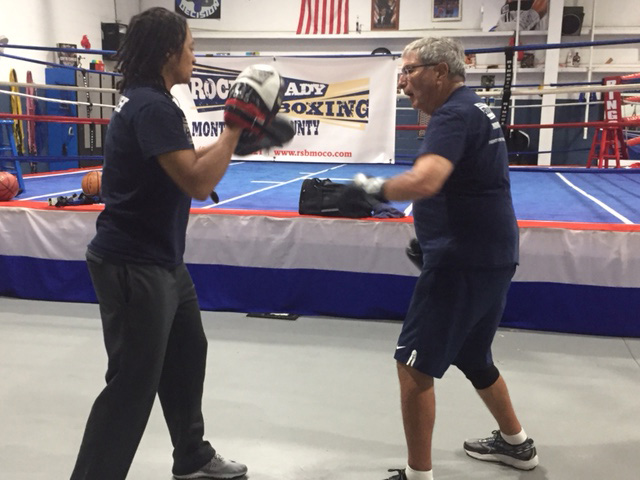

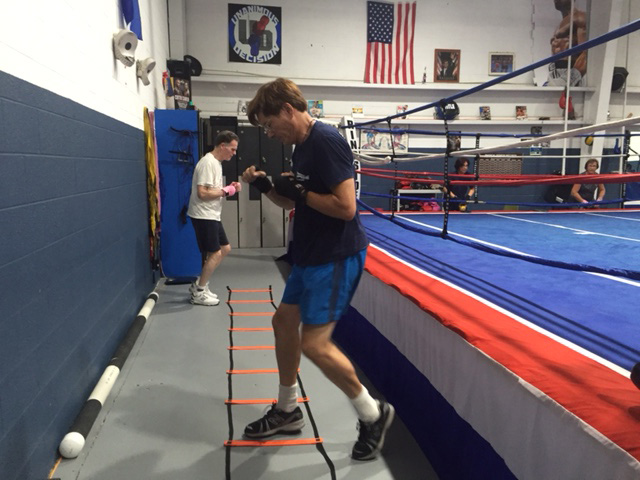

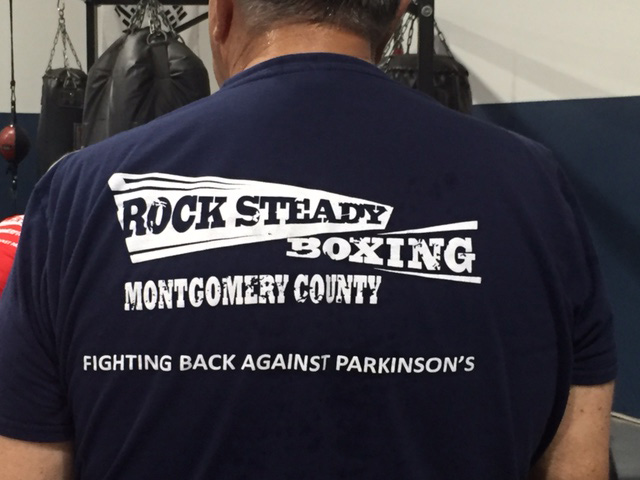
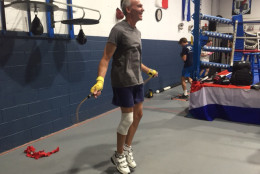
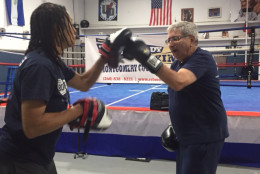
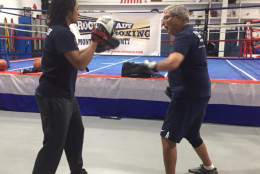
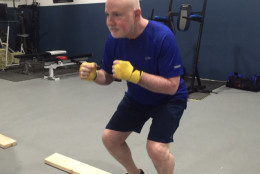
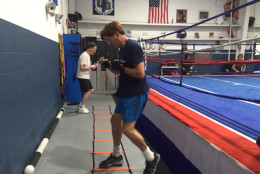

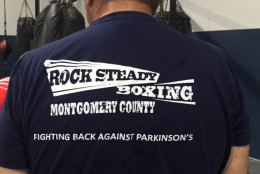
GAITHERSBURG, Md. — They call him “Jumping Jack” — an apt name for a boxer.
But Jack Lewis is no ordinary fighter. Watch him as he quickly and gracefully jumps rope, and it’s hard to believe this 62-year-old from Silver Spring, Maryland, was diagnosed with Parkinson’s disease two years ago.
Lewis is one of about two dozen fighters with Parkinson’s who show up each week for classes at Rock Steady Boxing of Montgomery County. On Wednesdays and Saturdays, these fighters brave traffic and gather at a Gaithersburg gym for a workout that Lewis calls “transformational.”
He sits near the gym entrance, pointing to others wrapping their wrists and moving through a warm-up. As they do, the telltale signs of Parkinson’s disappear.
“It kind of leaves you. The tremors leave you and the rigidity leaves you,” Lewis said.
The physical workout is tough, but it’s designed to accommodate various levels of the disease. When 77-year-old Stan Goldman, of Potomac, started the program in January, he was considered a high risk for falls. His coordination and balance were impaired and he shuffled when he walked.
Now, he hits the punching bag with ease, and spars with his coaches so well that they refer to him as “Stan the Man.” Goldman takes the compliment with a shy grin, saying he just didn’t want to see himself “disintegrate.”
That is a common sentiment in the group — every time they step into the gym to box, they are also fighting back at Parkinson’s disease.
Joe Loftus, a 58-year-old Kensington resident who was diagnosed with Parkinson’s a decade ago, says boxing helps him both physically and mentally.
“Fighting the disease is better than giving up and letting it win,” he explained.
Gesturing toward the punching bag he added: “You have got the power and you have got the balance and you kind of forget about the disease itself.”
The boxers of Rock Steady are young and old, male and female, including the “tag team” of Amalia Slater and Andrea Boyarsky-Meisel.
Slater is a 72-year-old from Potomac who spent most of her adult life making sculptures out of stone. She gave up her art and all the physical activity it entailed when Parkinson’s began to limit her movement and strength.
Her friend, Boyarsky-Meisel, of Chevy Chase, told Slater about the boxing class, and volunteered to go with her to offer help and moral support.
Both are now fixtures of the group. Slater, who admits she prefers dancing, has mastered some of the footwork of boxing.
“I can do things I could not do,” she said.
When she hears those words, Boyarsky-Meisel just smiles. She is now a program volunteer and assists the two female founders of Rock Steady Boxing’s Montgomery County program.
The fighters say these coaches, Angel McNamara and Makeda Richardson, are the heart of the program.
“Angel and Makeda are the motivators,” said 66-year-old Gary Kohn of Greenbelt. “They are both loving and accepting people.”
Rock Steady began in Indianapolis in 2006. When McNamara, a former pro boxer and fitness trainer, learned about the program from a client, she called Richardson, who immediately suggested they buy plane tickets to Indiana.
By the time they completed the certification process and negotiated a gym contract, they already had a waiting list of Parkinson’s patients from Maryland who were eager to participate.
“To be able to help the folks in the Parkinson’s community to gain a better quality of life — it’s just an awesome opportunity. It is a gift of God,” McNamara said.
Research has shown the skills honed in boxing training — like agility, balance and hand-eye coordination — can help combat the symptoms of the disease that rob people of their motor skills, McNamara explains.
The two guide their fighters through each workout. McNamara quietly watches every move while Richardson acts more like a cheerleader, her voice rising above the beat of a James Brown tune designed to pump-up the class.
Richardson says they are building a community, where the focus is on the positive.
“We often tell our fighters when you come through this door, we are not moping around, we are not talking about woe is me, and you definitely cannot turn to the fighter next to you and say, ‘You don’t know what I am going through,’ because, in fact, they do.”
There is a certain bond between these coaches and their fighters, and a special camaraderie among all those participating in the program. Walk into the gym and one thing immediately becomes apparent: This is a family.
Ask McNamara what she has learned from the class and her answer is simple: “Never give up and never back down.”
Pose the same question to 62-years-young boxer Lew Morris of Takoma Park and he’ll speak about internal strength in the face of a potentially debilitating illness.
“I have learned that every one of us is going down the road differently,” he said. “Everyone here has a certain grace.”







